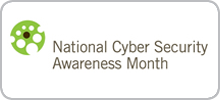
STAY SAFE ONLINE
View our Cybersecurity How-To Guide to learn safe online strategies and find additional Awareness resources.

EXPLORE TERMS
Explore an interactive glossary of Cybersecurity terminology and learn about DHS' effort to create a standard lexicon.

CELEBRATE AWARENESS
October is National Cyber Security Awareness Month. Start planning your celebration today.
Why Cybersecurity Awareness?
Today, we are more interconnected than ever before. Americans enjoy the benefits and freedoms that cyberspace provides – we shop from our homes, bank from our smart phones, and engage friends from around the world through social networks. However, with each click of the mouse, citizens risk their online security if they have not taken the proper precautions to protect themselves and their Personally Identifiable Information (PII). Cybersecurity involves protecting that information by preventing, detecting, and responding to attacks.
Many of our lives depend on digital technology, which makes cybersecurity one of our country’s most important national security priorities. While the government is taking steps to keep our cyber community safe, the government alone cannot solve the problem. Cybersecurity is a shared responsibility. From law enforcement and industry to academia and most importantly members of the public, we each have to do our part to keep the Internet safe. When we all take simple steps to be safer online, it makes using the Internet a more secure experience for everyone.
 What can I do to Protect Myself?
What can I do to Protect Myself?
While there are no guaranteed ways to protect yourself from a cyber attack, there are some simple steps you can take to help keep your PII secure.
- Set secure passwords and don’t share them with anyone. Avoid using common words, phrases, or personal information and update passwords regularly.
- Keep your operating system, browser, anti-virus and other critical software up to date. Security updates and patches are available for free from major companies.
- Verify the authenticity of requests from companies or individuals by contacting them directly by phone. If you are being asked to provide personal information via email, you can independently contact the company directly to verify this request.
- Pay close attention to website URLs. Malicious websites sometimes use a variation in common spelling or a different domain (for example, .net instead of .com) to deceive unsuspecting computer users.
- For additional tips and resources visit the Department of Homeland Security’s Stop.Think.Connect.™ Campaign.
Find additional safe practices for email, phone, and social media from DHS Cybersecurity Tips and US-CERT Tips.
-
Tuesday, March 20, 2012 - 10:16
-
Tuesday, March 20, 2012 - 10:16
-
Tuesday, March 20, 2012 - 10:16
-
Tuesday, March 20, 2012 - 10:16
-
Tuesday, March 20, 2012 - 10:16
-
Tuesday, March 20, 2012 - 10:16
-
Tuesday, March 20, 2012 - 10:16
-
Tuesday, March 20, 2012 - 10:16
-
Tuesday, March 20, 2012 - 10:16
-
Tuesday, March 20, 2012 - 10:16
 Official website of the Department of Homeland Security
Official website of the Department of Homeland Security

